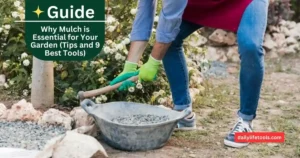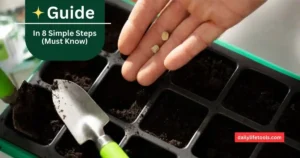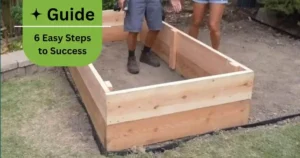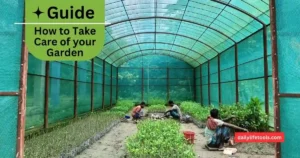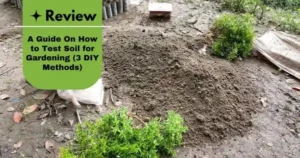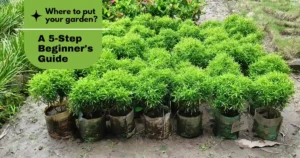I remember the first time I planted a seed. It was a small, brown bean, and I was so excited to watch it grow.
I carefully placed it in the soil, watered it gently, and waited. Days turned into weeks, and still, nothing happened.
I started to worry that I had done something wrong. But then, one morning, I saw a tiny green shoot poking through the soil.
My heart swelled with joy. I had done it! Since then, I’ve learned a lot about gardening, both from books and my own mistakes.
I’ve discovered that gardening is not just about growing plants; it’s about connecting with nature, learning patience, and sharing the happiness of nurturing life.
Hi, I’m Hasan. In this article, we’ll explore some of the 15 common gardening mistakes that even experienced gardeners make.
By avoiding these traps, you can grow a beautiful and successful garden.
Table of Contents
15 Common Gardening Mistakes
1. Planting Too Much
Overplanting can lead to overcrowding and insufficient resources for your plants to thrive.
Start small and expand as you gain experience.
2. Improper Watering
Avoid watering during the hottest part of the day, as it causes evaporation and can scorch plants. Water deeply in the early morning or evening to ensure proper absorption.
3. Neglecting Soil Health
Healthy soil is the foundation of a thriving garden. Test your soil, amend it with compost or organic matter, and maintain proper pH levels for your plants.
4. Forgetting to Mulch
Mulch retains moisture, suppresses weeds, and regulates soil temperature. Forgetting to mulch can lead to soil drying out and weed overgrowth.
5. Incorrectly Placing Plants
Plants need the right amount of sunlight and space. Placing shade-loving plants in full sun or crowding plants can stunt their growth and cause stress.
6. Planting at the Wrong Depth
Planting seeds or plants too deep or shallow can prevent proper root development. Follow planting guidelines specific to each type of plant.
7. Planting Too Early or Out of Season
Starting your garden before the last frost date or planting crops unsuitable for the season can damage your plants. Always check your local planting calendar.
8. Overwatering or Underwatering
Overwatering can cause root rot while underwatering leads to dry, stressed plants. Ensure a consistent watering schedule and monitor soil moisture levels.
9. Ignoring Plant Spacing
Crowded plants compete for sunlight, nutrients, and water, which can hinder growth. Proper spacing allows plants to grow to their full potential.
10. Failing to Fertilize
Plants need nutrients to thrive. Skipping fertilizer or using the wrong kind can limit plant growth. Use organic or synthetic fertilizers based on your soil’s needs.
11. Letting Weeds Take Over
Weeds steal nutrients, water, and sunlight from your plants. Regular weeding and preventive measures, like mulching, keep them under control.
12. Not Controlling Pests
Ignoring pest problems can quickly lead to plant damage or loss. Monitor your garden for signs of pests and use eco-friendly solutions like neem oil or introducing natural predators.
13. Forgetting Maintenance
A thriving garden requires regular care, including pruning, weeding, and checking for pests or diseases. Set aside time each week for upkeep.
14. Giving Up Too Soon
Gardening requires patience. Plants need time to grow, and mistakes are part of the journey. Learn from them and keep experimenting!
15. Neglecting Wildlife
Gardens thrive when pollinators like bees and butterflies visit. Plant native flowers and avoid harmful pesticides to create a wildlife-friendly environment.
Tips for Beginners
- Start small and build your garden step by step.
- Choose plants suited to your climate and soil.
- Place your garden where you can easily access and monitor it.
- Focus on learning and observing your plants.
Remember: Every gardener, no matter how experienced, makes mistakes. What matters is learning from them and enjoying the process.
Watering Wrong
- Do not water during the warmest temperatures of the day.
- The best time to water your plants is first thing in the morning.
- Make sure your soil is deeply absorbing the water by soaking the plants in water.
Snails Sneaking Up on you
- Many gardeners face invasions of slugs 6- snails.
- If they become out of control they can destroy your plants quickly so it’s best to prevent it.
Mowing Mad
- Do not cut your grass too short, especially in the dry season.
- Longer grass holds moisture better.
Don’t overdo it
- Big gardens take a big effort
- Start small &-build on your success
Not Planning Your Garden
- Make sure you check when the best season is to plant
- Make sure you have learned whole conditions & care your plants need
- Focus on sunlight and water soil.
Killing your House Plants
Do not neglect your houseplants when you are so focused on what is happening outside.
Every plant is different so read up on your houseplants & learn what they need to thrive.
Out of Sight, Out of Mind
Try not to plant your vegetables and herbs in an area that is rarely visited. People tend to forget about plants that aren’t in their view.
Crowding your Plants
People often lend to plant a lot & all close together. Remember that plants will grow and need a lot of space to do so.
Tips to Slow Snails
- Crushed eggshells, gravel, or mulch
- Coffee ground
- Copper tape around the base of your container
- Feed the slugs to lure them away from plants
- Bring in a hedgehog
- Otise slug pellets
How do I become a better gardener?
10 ways to become a great gardener:
- Take classes.
- Read good gardening books.
- Improve your soil.
- Pay attention.
- Go on garden tours.
- Read More...
Conclusion
Gardening is a rewarding hobby that can bring joy and beauty to your life.
By learning from common gardening mistakes and assuming the process, you can create a thriving garden that you’ll cherish for years to come.
Remember, every gardener, no matter how experienced, makes mistakes. The key is to learn from them and keep experimenting.
So, don’t be afraid to get your hands dirty and have fun!
Thanks for reading… Happy Planting… Hasan, Your Friendly Neighborhood Home Garden Hobbyist.
What is the difference between etiquette and gardening?
Etiquette refers to polite behavior in different situations. Gardening, on the other hand, is the practice of growing plants. This article focuses on common mistakes people make when caring for their gardens, not social rules.
What’s a common garden approach?
There are many garden approaches, but a common one involves planning your garden layout, choosing suitable plants for your climate, and providing them with the right amount of water and sunlight. This article doesn’t go into specific approaches but focuses on mistakes that can happen with any approach.
How does gardening benefit me?
Gardening can be a relaxing and rewarding hobby. It gives you fresh fruits, vegetables, or flowers, and can improve your mood and reduce stress. This article focuses on avoiding mistakes to help you enjoy a successful garden!
Are there any chemical changes in a garden?
Yes!
Plants undergo a crucial chemical change called photosynthesis. They use sunlight, water, and carbon dioxide to create their food (glucose) and release oxygen. This article focuses on mistakes humans make in caring for gardens, not the amazing chemical processes plants perform.
Is this article for beginners or experienced gardeners?
This article is helpful for both beginners and experienced gardeners! Even seasoned gardeners can make mistakes. The article provides tips to avoid common pitfalls and help you have a thriving garden.

